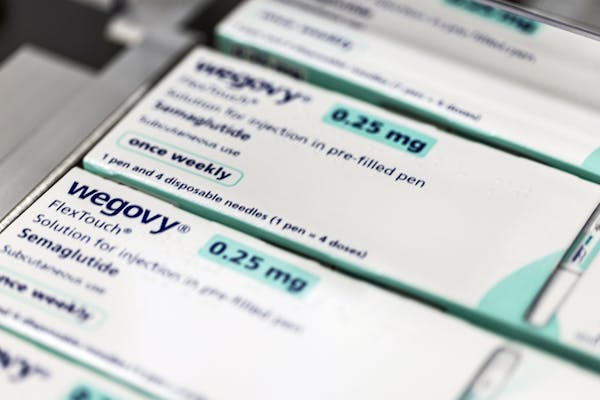Hattie Cronk isn't ashamed that she used trendy GLP-1 drugs to help her lose 60 pounds in one year, but she is ready to see if she can maintain her progress without them.
It's a gamble for the 39-year-old Eden Prairie woman, given current scientific thinking that the drugs must be taken long-term, if not for life. Dieting alone never worked for her.
"I've done keto, I've done vegan, I've done paleo," she said. "I've done Whole30, I've done cabbage soup, I've done intermittent fasting. I mean, I've done no carbs and I've done carnivore and I've done omnivore — like everything."
If Cronk and others like her succeed — losing weight with the drugs and keeping it off without them — they could solve a billion-dollar dilemma for Minnesota. The state's insurers and employers can't afford the tsunami of diabetes, heart disease and knee replacements that is coming with Minnesota's rising obesity rate. They also can't afford to dole out lifetime supplies of GLP-1 medications such as Wegovy and Ozempic.
Short-term usage could make the $800 to $2,000-per-month drug costs bearable, but only if people maintain their weight loss, and that is far from certain. GLP-1 injections flood the stomach with hormones that reduce appetite and indicate fullness, but the effects are temporary.
"It's hormone replacement therapy. When you take away that hormone, people will kind of return to how they were before," said Dr. Carolyn Bramante, a U of M weight management specialist. Some people even report worse hunger afterward.
People gained two-thirds of their weight back on average in the year after they stopped receiving the medication, according to results published in 2022 of a global clinical trial funded by Novo Nordisk, which makes Wegovy and Ozempic. Other chronic diseases such as high blood pressure are controlled with long-term medications, and obesity simply might require the same approach, the manufacturer said in a statement.
Wisconsin-based Epic Systems reported a little more success in January, after studying 20,000 patients who lost five or more pounds: 44% regained all or more weight a year after after halting medication, but 36% actually lost more weight.
Cronk is optimistic, though her doctor doesn't think it's a good idea to discontinue the medication and genetics aren't on her side. Obesity and unhealthy body images run throughout her extended family.
"That's what I grew up with, you know, all my aunts drinking Diet Coke and everybody was always on a diet," she said.
At stake is more than numbers on a scale. The busy mother of two and corporate vice president can now carry her daughters upstairs without getting winded. She no longer rubs up against adjacent passengers in economy airplane seats.
Cronk started taking the medications a year ago while also working with a trusted trainer at Life Time Fitness in Eden Prairie on strength and weightlifting exercises. She was sore for days after the first attempt, but over time she nearly doubled what she can deadlift, reaching 165 pounds. She can do a headstand in yoga. Nutritional counseling has changed her outlook on food, and she said she no longer reaches for snacks when stressed.
"I can always get back on it if I need to," Cronk said, "but I feel like I've done enough to set myself up, and now I'm kind of excited to see how I do without the medication this summer."
Emerging research supports her approach. Danish researchers examined differences in people who stopped taking GLP-1 injections, and reported last month that those who participated in structured exercise were more likely to maintain weight loss.
Life Time is putting that finding to the test at its Twin Cities fitness clubs. The Chanhassen-based fitness company is offering an off-brand, lower-dose GLP-1 medication from a compounding pharmacy at about $400 per month to members in its MIORA lifestyle program.
Novo Nordisk raised safety concerns about any provider offering a compounded GLP-1 alternative, which isn't subject to the same oversight and testing as brand-name drugs. MIORA executive director Jeff Zwiefel countered that pharmaceutical companies don't want competition to their blockbuster drugs.
Life Time's goal is for people to gradually lose weight with the lower-dose alternative and keep it off through fitness and nutritional counseling, Zwiefel said. "Sure, Big Pharma wants them to be on them for the rest of their life. We want them on them to get started on a healthy way of life."
If short-term medication usage doesn't work for most people, it means a staggering waste of money and a continuation of Minnesota's obesity epidemic. The state has seen its adult obesity rate rise from 17% in 2001 to 33%. Public health leaders already are concerned about the hype on social media channels, promoting GLP-1 medications as quick fixes in the absence of healthy habits.
"You have people that are going to high school reunions and want to lose weight, so they want one of these drugs," said Stephen Schondelmeyer, a U professor and national expert in pharmaceutical economics. "It isn't meant for short-term weight loss."
Eagan-based Prime Therapeutics, a pharmacy benefits manager, reported last July that two in three people who started taking GLP-1 medications had quit within a year. Rising out-of-pocket costs and side effects such as nausea likely played a role, along with unrealistic expectations.
Cronk doesn't receive the GLP-1 product from Life Time and instead spends $600 a month to self-administer one of the brand-name medications prescribed by her doctor. On the good side, she said it's getting harder to find squishy parts on her body that make for easy injections. On the down side, the costs are mounting, even with a manufacturer's discount. Her insurance company has denied six appeals for coverage.
Minnesota lawmakers are responding to such concerns with a proposal to mandate insurance coverage of weight-loss medications, even as the state faces its own cost pressures from the drugs. Quarterly state Medicaid spending on Wegovy alone surged from $550,000 at the start of 2022 to $5.9 million in 2023, and increased for other GLP-1 drugs such as Ozempic, which is federally approved for diabetes but increasingly prescribed off-label for weight loss.
Costs are influencing Cronk's decision to wean off the drugs, but she is interested in seeing if her new habits can sustain her progress. She has a believer in her Life Time trainer, Lindsay Ogden.
Ogden said the big difference with Cronk is that she enjoys working hard in strength classes and eating better at home and seeing the results. She said that should make it easier for her to stay motivated when medication is no longer part of her weight loss regimen.
"She likes coming here, she likes the people," Ogden said. "She likes getting her butt kicked for some reason. I don't know why."

Thief River Falls' Arctic Cat sold to group that includes former executive

First hotel built on Lake Minnetonka in a century opens May 1
University of Minnesota's Osterholm spearheads effort to restore vaccine confidence

Competition for Twin Cities homes between $250K and $500K is fiercer than ever

